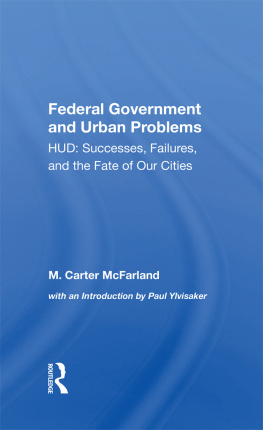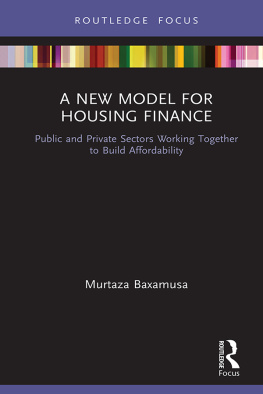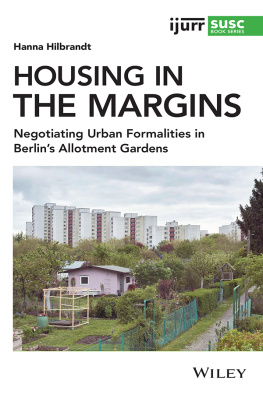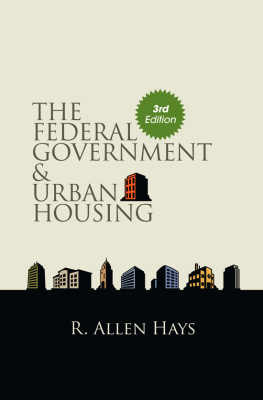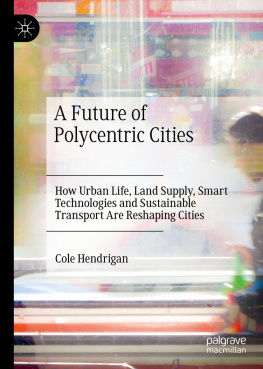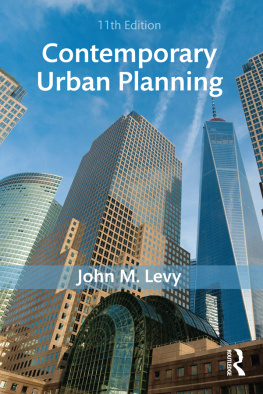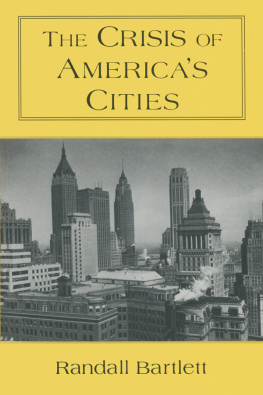Federal Government and Urban Problems
HUD: Successes, Failures, and the Fate of Our Cities
Federal Government and Urban Problems
HUD: Successes, Failures, and the Fate of Our Cities
M. Carter McFarland
with an Introduction by Paul Ylvisaker
First published 1978 by Westview Press, Inc.
Published 2019 by Routledge
52 Vanderbilt Avenue, New York, NY 10017
2 Park Square, Milton Park, Abingdon, Oxon OX14 4RN
Routledge is an imprint of the Taylor & Francis Group, an informa business
Copyright 1978 Taylor & Francis
All rights reserved. No part of this book may be reprinted or reproduced or utilised in any form or by any electronic, mechanical, or other means, now known or hereafter invented, including photocopying and recording, or in any information storage or retrieval system, without permission in writing from the publishers.
Notice:
Product or corporate names may be trademarks or registered trademarks, and are used only for identification and explanation without intent to infringe.
McFarland, M. Carter.
The Federal Government and Urban Problems.
1. United States. Dept. of Housing and Urban Development. 2. Housing policy
United States. 3. Cities and townsUnited States. I. Title.
HT167.2.M33 301.3630973 77-26301
ISBN 13: 978-0-367-29211-9 (hbk)
To Neal J. Hardy and Philip N. Brownstein, tutors, friends, and exemplary public servants
This book is about the programs and performance of the Department of Housing and Urban Development (HUD). It deals principally with the present and future of that department and the cities it was designed to serve. History, of which there is much, is considered only to the extent it seemed necessary to illuminate the current issues.
This work evaluates all of HUD's many major programs and suggests ways in which their performance might be improved. This is a vast, perhaps presumptuous undertaking, for it takes us into economics and housing finance, political science, urban planning, the myriad pathologies of slum life, racial discrimination, research, and other subjectseach of which is a specialized field in itself. This broad treatment also makes necessary relatively brief coverage of many subjects which might easily be, and have been, the subject of an entire book. The purpose is to show the broad sweep of HUD's activities and their interrelations.
The performance of numerous past and present HUD officials is evaluated. This is not for purposes of gossip, but rather because it is this writer's conviction that the policies and performance of a government department cannot be understood fully without consideration of the skills and attitudes of the personalities whose influence was crucial. The discussion of personalities is not ad hominem praise or criticism, it is as objective as this writer can make it. Nearly all of those discussed are good friends of the writer.
This book can also be read as a case study of federal government and the people it represents, and its efforts to deal with the increasingly complex problems into which government has been thrust during the past decade or more. This recurring theme appears in nearly every chapter, like the overtones which give color and character to a note of music. The last chapter is devoted entirely to this second, but by no means unimportant, theme. A reader interested primarily in only one or more of HUD's programs, not the entire symphony, can use the table of contents to find those with which he is particularly concerned.
In a direct sense, the substance of this book comes from the writer's many years as a career public servant intimately involved with the programs of HUD and its predecessor agencies (under six presidents), mostly in the role of policy developer, implementor, and evaluator.
In another sense, this book reflects the experiences of an entire generation of urban and housing specialists, for many scores of them, in and out of government, have shared their wisdom with me. Whatever merit this book has, I owe to the generosity of these many friends and professional associates. Its limitations, however, are mine, not theirs.
The people who have given generously of their time and knowledge are too numerous to mention here. But I must make four exceptions. My most sincere thanks go to former HUD Secretary Robert C. Weaver for initially encouraging me to undertake such a book and for the great help he has provided in his penetrating comments on most of the chapters. I am also much indebted to Hilbert Fefferman, who has generously edited the entire manuscript and improved it greatly, and to John Del Vecchio for his careful reading of the page proofs. Lastly, I am grateful to Dean Paul Ylvisaker of Harvard University for the introduction he has written and for encouraging me to pursue the book in terms of the tones as well as the overtones implicit in what I believe to be a subject of great importance to the nation.
I also acknowledge with gratitude the generous support of the Ford Foundation, the National Association of Realtors, and the National Development Corporation of Pittsburgh.
M. Carter McFarland
Paul N. Ylvisaker
The word cities (by quick count) appears only twice in the sixty pages of legislation that created the U.S. Department of Housing and Urban Development in 1965 and finally recognized that ours was no longer a nation of farmers. Revealingly, those solitary references come when the law gets round to the subject of demolition and deterioration.
There was melancholy genius in the sparing use of the term. Cities is the code word for what most Americans want to forget: an environment they have tried to escape; a gathering point for minorities, the poor, the infirm, and others they do not want on their consciences; a way of life that challenges their conventional values; and increasingly, a frightening reminder that neither life nor the American Dream is all that secure.
Knowing as much, those who drafted the legislation in the Kennedy-Johnson era artfully turned to other and more euphonious language to capture the votes of a loosely allied majority. Urban was the most attractive and resilient of these supposed synonyms: it spoke to everyone's condition, no matter how disparate those conditions actually were. And the mayors of the big cities did not complain. Quite the contrary: U.S. presidents and the Congress were finally ready to recite something other than a rural creed, and if they felt better saying urban rather than cities, so be it.
The strategy was politically astute. It did achieve cabinet status for the one federal agency that spoke the vernacular of cities. It has given sustenance to cities, if only to provide a national forum in which they and their problems are routinely on the public's agenda.
But the law and its coalition-building terminology left both HUD and U.S. cities (i.e., the larger, older, and more industrial cities) with the almost impossible task of winning and holding majority support for policies and programs substantial enough to make a difference. What might make a difference? A national land policy that allowed less of a devil-take-the-hindmost exodus from built-up areas and a less anarchic exploitation of open landwith appropriate tax policies to accompany it. A national housing policy that at least reversed the 4-1 edge in subsidies given the wealthier over the poorer. An economic development policy that encouraged industrial cities to move ahead more rapidly into the service economy. Welfare, health, and investment policies that made cities something other than traps for the needy and unemployed.

